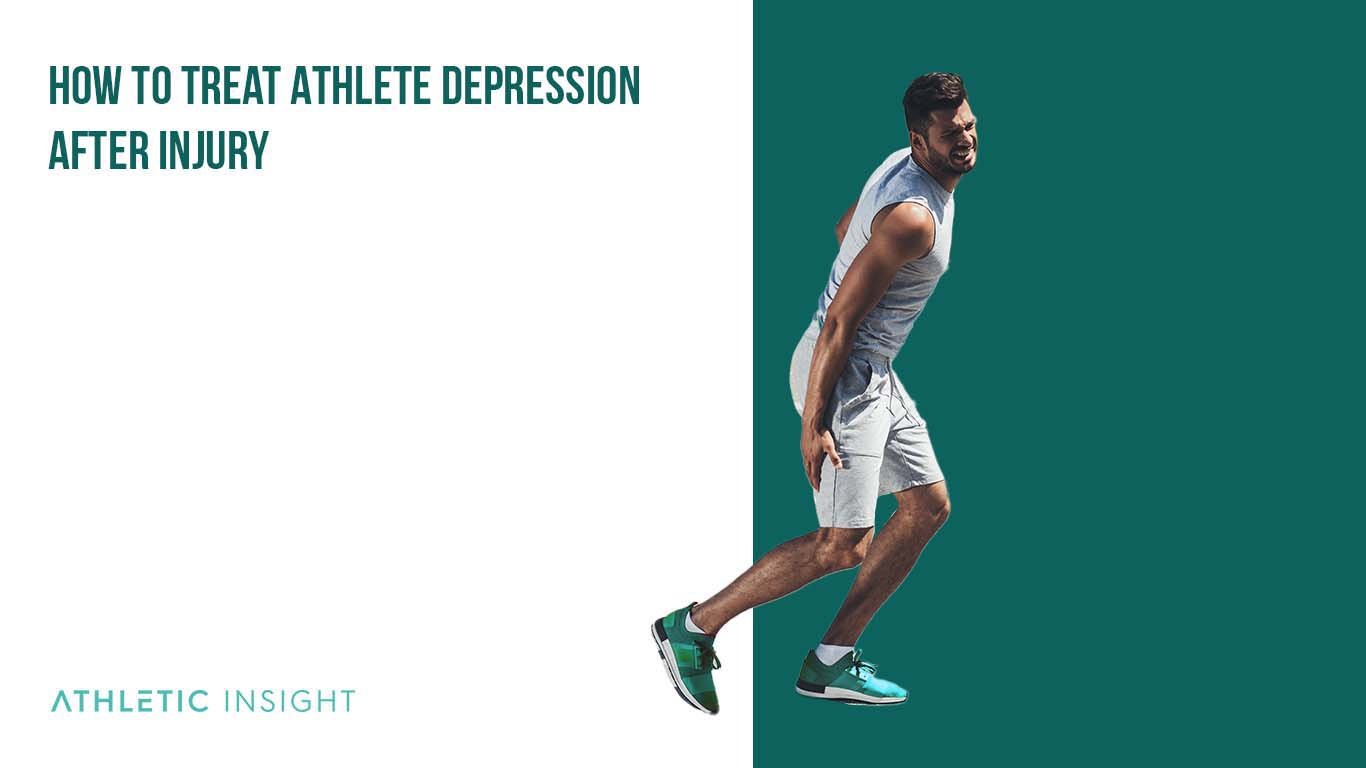No athlete wants to sit on the sidelines. However, injuries are almost inevitable even while team physicians, trainers, and coaches try to prevent them.
Sports are a universal activity, giving people the chance to be a part of a team, better themselves every day, and work towards a goal. And while it can provide benefits to the body and mind, there are also negative effects on mental health. Athlete depression is just one of these effects.
Sports injuries and mental health go hand in hand, with one affecting the other. Research has looked at the scientific aspects of injuries in athletes and found that psychological responses play a role in the recovery process.
How Does Science Affect the Psychological Impact of Injuries?
Some may believe that science and sports are two separate things, having absolutely nothing to do with each other. They couldn’t be more wrong! Psychological phenomena and physiological aspects directly impact the way athletes perform and recover from injuries.

Studies are beginning to look inside both the negative and positive effects of injuries in athletes. One study looked at how the principles of psychology can play an important role in how athletes recover and in how injuries are prevented.
Other psychologists mention how psychology can cause mental blocks and poorer performance in athletes, leading to injuries.
Can Sports Affect Mental Health Negatively?
Yes, sports can negatively affect an athlete’s mental state.
While sports can have positive effects on mental health, studies have shown the darker side to playing a sport, the side that causes emotional distress, eating disorders, low self-esteem, and more. Repeated injuries (especially to the head) have been shown to cause more serious mental health issues.
Physical injuries aren’t the only consequence of sports. Dr. Lisa Firestone, of Psychology Today, mentions that athletes are exposed to long durations of psychological stress.
A few examples of these stressors are as follows.
- Experiencing grief after parting with the sport
- The constant pressure of competing
- Comparison and self-esteem issues
- Feelings of loneliness or disconnection
The American Psychological Association noted dangers and risks that athletes deal with, including the exposure to challenges that can cause them to have increased anxiety and depression.
Can Psychological Impact of Injuries Be Treated With Mental Imagery?
Many athletes do not know how to cope with an injury and are not prepared to get back to playing, which harms their performance. Injuries have lasting effects on the psychological state, but research has shown promise that the process of mental imagery can combat those effects.
What is mental imagery? It’s also called mental rehearsal and gets athletes to imagine themselves performing skills or their sport in a way to improve performance.
This technique has been studied across multiple sports and athletes, showing its benefits in helping them improve their performance and mental strength.
The literature shows how emotive, visual, and healing imagery could enhance injury rehabilitation. Each technique helps the athlete see themselves healing from their injury and performing again at a high level, giving them the support they need to overcome psychological blocks.
In short, many sports psychologists and professionals use mental imagery techniques combined with other methods to help athletes with injuries.
Is Sports Injury Depression A Common Thing Among Athletes?
Depression after a sports injury is not uncommon among athletes, as many emotional responses occur as they are healing and going through rehabilitation. Some athletes often feel like they don’t deserve anything leading to intense sadness.
Athletes are unsure of how to cope with injury depression. Many sports articles documenting athletes with injuries have picked up on this notion and decided to explore the effects of injuries on depression.
Is Injury Depression a Scientific Term?
Injury depression is not an actual scientific term, but that doesn’t make it any less important. A more accurate phrase would be post-injury depression, where athletes start to show depression-related symptoms.
Psychological responses to injury include the following.
- Anger
- Sadness
- Denial
- Identity loss
- Major confusion
- Increased anxiety
- Lack of effort
- Mood swings
Research done by the New York Times found that 51% of 353 male college athletes showed symptoms of depression. Due to the rising levels of mental illnesses in athletes, medical professionals prepare to help athletes get psychological treatment during and after an injury.
Depression in sports injuries is fairly common and is a big issue that needs to be addressed.
How To Treat Athlete Depression After Injury
It may not be easy for an athlete to seek out help. That makes it even more important for coaches, leaders, and trainers to look for athletes showing signs of depression after an injury. Research shows that a combination of professional help (counseling) and medical management can help athletes recover from injury.

Here are a few things you can do to help someone you know who’s suffering from post-injury depression or if you are an athlete and could use some ways to get better.
1. Monitor Symptoms and Emotional State
If athletes aren’t careful there can be long-term effects of injuries making treatment more difficult when getting them physically and mentally healthy.
Even while the athlete is in rehabilitation or counseling, it is important to continue monitoring their emotional state. Most often, symptoms do not occur until after the onset of the injury.
2. Provide Support
Support from coaches, trainers, and teammates is essential in the recovery process of athletes. Injuries can cause athletes to feel isolated, alone, and worthless since they cannot be on the field or the court.
3. Guide the Athlete into Seeking Counseling
It is widely accepted and encouraged for athletes to seek out professional psychological services when there are depressive symptoms present or when they need help with the emotional stress of playing a sport.
Some athletes may be resistant to seeking help since they may refuse to believe there is something wrong or they feel like they will not be able to play again. Giving them assurance and space to speak is crucial to let them trust that professional counseling can be a safe outlet.
Can an Injury Create Performance Anxiety?
When an athlete hasn’t played in a long time, their first game back may invoke performance anxiety. There may be fear of re-injury or worry over how they might perform.
Allison Winik, Ph.D., is a practicing psychologist and she explains that there is a treatment for athletes trying to handle performance anxiety. Some of the techniques include positive self-talk, muscle relaxation exercises, diaphragmatic breathing, and mindfulness.
The psychological impact of injuries on athletes can be devastating for some who don’t have the resources to recover. Luckily, many athletes have recovered from any big impacts on their mental health including overcoming performance anxiety.
How Can Nutrients Support Mental Health During Injury Recovery?
Nutrition plays a critical role in supporting mental health during injury recovery. Nutrients such as Omega 3’s, antioxidants, B vitamins, and protein are particularly beneficial for enhancing mood and cognitive function.
- Omega-3 fatty acids: Omega-3 fatty acids, found in fish, flaxseed, and walnuts, have been shown to reduce symptoms of depression and anxiety. These fatty acids are crucial for brain health, offering anti-inflammatory benefits that could also aid in physical recovery.
- Antioxidants: Antioxidants, found in fruits and vegetables, combat oxidative stress and may mitigate feelings of fatigue.
- B vitamins: B vitamins which can be found in whole grains, lean proteins, and leafy greens, are vital for energy production and the synthesis of neurotransmitters responsible for mood regulation, such as serotonin and dopamine.
- Protein: Adequate protein intake is essential not only for the physical repair of tissues but also for the production of amino acids that are precursors to mood-regulating neurotransmitters.
Ensuring a well-balanced intake of these nutrients can support both the physical and mental aspects of recovery, fostering a more positive outlook during the rehabilitation process.
What Exercises Aid in the Psychological Recovery of Injured Athletes?
Exercises that promote relaxation, mindfulness, and gradual physical engagement can significantly aid in the psychological recovery of injured athletes. Yoga and Pilates, for instance, focus on controlled movements and breathwork, enhancing mental focus and reducing stress and anxiety levels. These practices also offer the flexibility to adapt poses and exercises to accommodate physical limitations.
Aquatic therapy is another excellent option, as the buoyancy of water reduces strain on injured areas, allowing for gentle strengthening and mobility work in a soothing environment. Additionally, low-impact aerobic exercises, such as walking or cycling on a stationary bike, can boost mood through the release of endorphins while minimizing the risk of exacerbating injuries.
Incorporating these forms of exercise not only aids in physical rehabilitation but also contributes to emotional well-being by providing a sense of progress and control during the recovery period.
Which Supplements Help Improve Mood and Resilience in Recovering Athletes?
Several supplements have been identified for their potential to improve mood and resilience in recovering athletes such as Omega 3, Vitamin D, magnesium, probiotics..
- Omega 3 Supplements: Omega-3 fatty acids, as mentioned, are beneficial for their anti-inflammatory properties and their role in brain function, potentially alleviating symptoms of depression and anxiety.
- Vitamin D Supplements: Vitamin D supplementation can be particularly useful, especially for athletes recovering from injuries that limit their exposure to natural sunlight; vitamin D deficiency has been linked to increased risk of depression.
- Magnesium Supplements: Magnesium supplements plays a role in stress response regulation and has been found to have a calming effect, which could be beneficial during the stressful periods of injury recovery.
- Probiotics Supplements: Studies show that probiotics supplements also support mood improvement, as emerging research suggests a strong link between gut health and mental health.
It’s important to note that while these supplements can provide support during recovery, they should be part of a comprehensive approach that includes proper nutrition, physical therapy, and psychological support.


